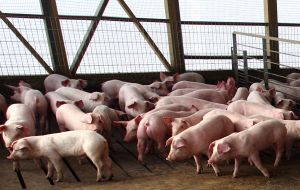MercoPress. South Atlantic News Agency
How do you remove and relocate half a million hogs? Chile is trying
 Half a million hogs went unfed and unattended for five days
Half a million hogs went unfed and unattended for five days How do you move and relocate half a million hogs? That is the challenge faced by Chilean sanitary authorities following the closure of the country’s largest pig farm forced after months of complaints from protesting neighbours about the persistent odours and infested waters.
Agrosuper abandoned the farm for five days alleging safety problems for its staff after neighbours from the small village of Freirina, 800 kilometres north of Santiago said ‘enough is enough’, blockaded access to the half million hogs and fought for several days with riot police.
The immediate reply from the Chilean government was to declare a sanitary emergency given the chances of significant mortality among the unfed unattended hogs, but this created an even greater problem by closing the farm and the abattoir.
“Not even the largest European stadium with 100.000 seats could lodge all the hogs tightly sitting one next to the other”, pointed out the Santiago media. For an immediate removal of the hogs an estimated 5.000 trucks, (100 hogs each) would be needed, but the other question is where can they be relocated, where is there enough capacity.
Faced with the situation the Chilean government gave Agrosuper six months to clear the farm and present an adequate plan for the elimination of organic residue from the plant responsible for the odours that turned a quiet peaceful village into violent protestors.
“The clearance plan must be an intelligent process so as not to cause an impact to the health of the nearby population”, said Deputy Health minister Lilian Sandoval.
To start with the sows are being eliminated to stop new litters, and an estimated 3.000 hogs per day are being trucked away to farms in the O’Higgins region, approximately 100 kilometres from Santiago.
But the new host region is not willing to accept the hog ‘invasion’ until “sanitary, environment conditions are ensured that they will not have an impact on human health or create a repeat of what happened in the north”, said Senator Guido Girardi, who represents the region.
Agrosuper has pig and broiler farms in O’Higgins region (half a million hogs and eight million chickens) which have already caused inconveniences among neighbours, pointed out Bernardo Cornejo, mayor of Litueche.
Agrosuper is one of the largest food corporations in Chile. In 2006 it was granted the certification to build an abattoir in the higher area next to Freirina (6.000 population) and located at the beginning of the Atacama Desert, the most arid in the world.
Apparently according to the first sanitary reports Agrosuper inaugurated a system by which specially introduced micro-organisms would eliminate all organic residue thus avoiding odours and accumulation.
However because of airing problems the system failed and the micro-organisms did not develop generating a massive accumulation of organic disposable matter plus an unbearable stench, which took over the small village of Freirina triggering the conflict.
However Jose Guzman Agrosuper general manager blamed the recent sanitary alert on the protestors surrounding the plant and farm, rather than the company.
Guzmán told La Tercera that the company was in the process of fixing the establishment’s sanitary flaws, which they had identified in November of last year, when protesters began blocking roads, forcing Agrosuper personnel to clear out the plant before the project was completed.
“We didn’t abandon the plant, we evacuated, which is very different,” Guzmán said. The plant was vacated by Agrosuper staff for five days, during which the facility and the half-million pigs inside were left uncared for.
“Buildings were burnt, the water sources were blasted with dynamite, trucks were robbed, and watch-guards were pelted with rocks,” he added. “Any lack of attention the animals experienced was produced by the lack of public order”.
The stench emanating from Agrosuper pig farm and abattoir had been a cause for concern in Freirina since September, when residents began to complain of headaches and stomach pains, among other reactions. Last week, the situation reached a breaking point, and community members took to the streets to pressure the plant’s closure.




Top Comments
Disclaimer & comment rules-

-

-

Read all commentsSo, after they are done relocating the Pinochet waste, what are they going to do about the pigs??
May 28th, 2012 - 09:00 am 0Chile has very low level livestock population.
May 28th, 2012 - 09:34 am 0Whilst I can personally understand the villagers discomfort that is no reason to deliberately destroy the water supply to the pigs and put them in distress.
May 28th, 2012 - 12:33 pm 0It also seems that the Agrosuper outfit were a bunch of incompetents from the very beginning.
Symbiotic systems like the one here need very careful planning and practical trials before setting the relationship in stone. Agrosuper clearly failed at this stage.
Commenting for this story is now closed.
If you have a Facebook account, become a fan and comment on our Facebook Page!